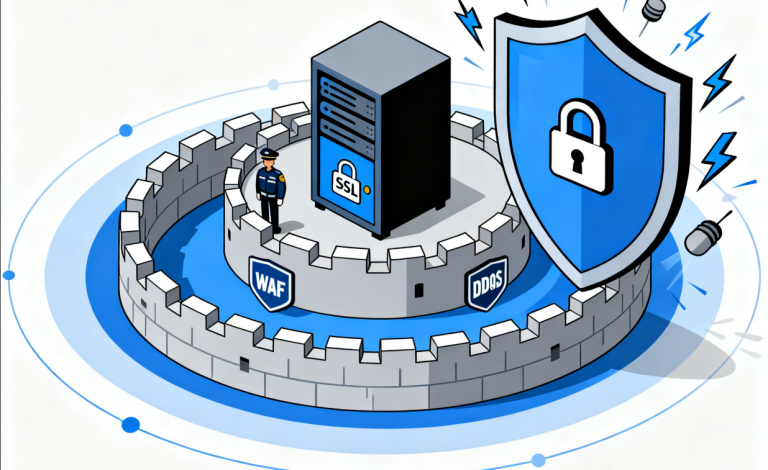
Do you ever feel like your online business is a fortress? You have a beautiful website, a steady stream of customers, and great products. You feel safe. But what if your fortress has a gaping hole in the wall that you can't even see? What if the digital goods you’re so proud of are sitting out in the open, vulnerable to attack? It’s a terrifying thought, isn’t it? A sudden, jarring realization that your digital assets—your website, your data, your customer information—are far more exposed than you thought. You might have an SSL certificate, but is that really enough? This is a question that every business owner, big or small, needs to ask themselves. Security isn't a one-time fix; it's a multi-layered defense system. And in today’s world, a comprehensive security strategy requires you to look beyond the padlock and into the cloud.
Let's cut through the confusion. You've heard a lot of buzzwords—SSL, HTTPS, firewalls, DDoS protection—but how do they all fit together? Think of your digital presence as a physical building. The SSL certificate is the front door lock. It’s essential for privacy and trust, but it can't stop a smash-and-grab or a full-scale assault on the building itself. Cloud security, on the other hand, is the entire security system for your building—the perimeter fence, the security guards, the alarm system, and the reinforced windows. A truly secure business doesn't just lock its door; it protects its entire property.
So, let's explore this comprehensive approach to digital security and why you need both a strong SSL certificate and a robust cloud security strategy to protect your business's future.
Phase 1: The First Line of Defense - Why SSL Is Non-Negotiable
We’ve talked about this before, but it's the foundation of everything. The SSL certificate is the bare minimum for a credible online presence. It enables HTTPS, which encrypts the data between your website and your visitor. This protects against a hacker intercepting sensitive information like login credentials or credit card numbers. It’s your handshake of trust.
But beyond basic encryption, an SSL certificate provides a crucial layer of trust. When a user sees the padlock icon and your company's name in the address bar (with an OV or EV certificate), it sends a powerful, subconscious signal: "This website is legitimate, and they care about my privacy." In a world full of phishing scams and fake websites, this simple signal is a huge competitive advantage. It’s the difference between a visitor trusting you enough to complete a purchase and running away in fear.
Without an SSL certificate, you're not just risking data; you're actively losing customers. Modern browsers and search engines actively penalize unsecure sites, labeling them as “Not Secure.” This isn’t a small slap on the wrist; it’s a public shaming that can destroy your brand’s reputation.
Phase 2: The Perimeter Defense - Cloud Security as a Shield
Now that your front door is locked, it's time to build the rest of your fortress. This is where cloud security comes in. While an SSL certificate protects the data in transit, it doesn't protect your website itself from a direct attack. That's a different kind of security problem.
Think of it this way: your website is the building, and the cloud is the property it's built on. A good cloud security strategy, often provided by a Content Delivery Network (CDN), offers a multi-layered defense that protects your site from a wide range of threats.
DDoS Mitigation (The Perimeter Fence): Your website is constantly exposed to the threat of a Distributed Denial of Service (DDoS) attack. Malicious actors use a network of compromised devices to flood your site with so much traffic that it crashes. A CDN with DDoS mitigation acts as a perimeter fence that absorbs the attack far away from your website. It’s a massive, distributed network that can filter out malicious traffic and keep your site online and available for real customers. This is your first and most crucial line of defense against online sabotage.
Web Application Firewall (WAF) (The Security Guards): Your website, like any building, can have vulnerabilities. A WAF is a security guard stationed at the entrance of your application. It inspects every request and blocks known attacks like SQL injection, cross-site scripting (XSS), and other application-layer threats. It’s a proactive, intelligent defense that protects your website from being exploited, ensuring your visitors and their data remain safe. You can't just lock the door and assume no one will try to break in through a window. A WAF patrols those windows.
Bot Management (The Bouncer): The internet is crawling with bots, and many of them are malicious. They can scrape your content, steal your pricing data, or try to hack your login forms. A good cloud security service includes bot management that can distinguish between human users and automated scripts. It’s like a bouncer at a club who can spot the troublemakers and keep them from ruining the party for everyone else. This not only protects your site but also conserves your server resources for real customers.
Phase 3: The Seamless Synergy - How They Work Together
The true power of this security strategy isn't in each component's individual strength, but in their perfect synergy. An SSL certificate and a cloud security service don’t just exist in parallel; they are a complementary system that builds a complete shield around your digital presence.
A high-performance CDN, for example, makes your SSL certificate even more efficient. By offloading the SSL handshake to its closest edge server, a CDN reduces latency and improves the speed of your secure connection. This means you don't have to choose between a fast website and a secure one; you get both.
Furthermore, by combining SSL encryption with a WAF and DDoS protection, you're creating an end-to-end security solution. The SSL certificate handles the encryption, while the cloud security service handles the traffic filtering and threat detection. It's a comprehensive approach that leaves no stone unturned.
Ultimately, your digital presence is your most valuable asset. The confusion around online security can be overwhelming, but the sudden realization is this: a single-layer defense is no defense at all. To protect your brand, your data, and your customers, you need to think beyond a simple padlock. You need a comprehensive strategy that combines the foundational trust of an SSL certificate with the robust, multi-layered defense of a cloud security service. This isn't just a technical recommendation; it's a fundamental requirement for succeeding in today's digital world. It's the difference between a building with a lock on the door and a fortress with a perimeter fence, security guards, and a vault. Which one would you rather put your business in?

